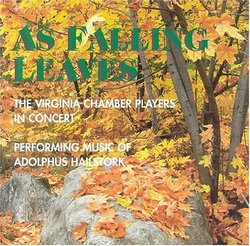| All Artists: Adolphus Hailstork, Virginia Chamber Players, Charles Woodward Title: As Falling Leaves: Music by Adolphus Hailstork Members Wishing: 0 Total Copies: 0 Label: Albany Records Original Release Date: 1/1/2000 Re-Release Date: 1/27/2004 Genre: Classical Styles: Chamber Music, Forms & Genres, Concertos, Historical Periods, Classical (c.1770-1830) Number of Discs: 1 SwapaCD Credits: 1 UPC: 034061061229 |
Search - Adolphus Hailstork, Virginia Chamber Players, Charles Woodward :: As Falling Leaves: Music by Adolphus Hailstork
 | Adolphus Hailstork, Virginia Chamber Players, Charles Woodward As Falling Leaves: Music by Adolphus Hailstork Genre: Classical
|
Larger Image |
CD DetailsSimilar CDs
|
CD ReviewsHailstork's Chamber Music Superbly Played J Scott Morrison | Middlebury VT, USA | 03/15/2004 (4 out of 5 stars) "The memorably-named Adolphus Hailstork (b. 1941) is a widely played and recorded composer who has long been associated with Old Dominion University in Norfolk, Virginia. This CD is a collection of chamber pieces played by some of his fellow Virginians, most of them members of the Virginia Symphony. For me, by far the most interesting piece here is a striking, tightly crafted and effective String Quartet (2001; marked as No. 1, although I am not aware of any other string quartets among Hailstork's works), played by principal string players of the Virginia Symphony: Vahn Armstrong and Amanda Gates-Armstrong, violins; Jennifer Snyder, viola; and Michael Daniels, cello. A four movement work, the quartet has strong thematic material that recurs in various forms throughout the piece. Particularly engaging is the second movement Adagio which has a lovely and serene main theme, originally written for a choral piece; that theme makes appearances, much transformed but still recognizable, in the other movements. These transformations serve to unify the work as a whole. The quartet is given a strong and convincing performance. On the basis of this recording, I certainly hope Mr Hailstork will be writing more string quartets.'Arabesques' is a five-movement suite written for flute and percussion, and specifically for the husband-and-wife team of symphony musicians Debra Cross, flute, and Robert Cross, percussion. It begins with a movement for flute alone, followed by one for vibraphone alone and culminating in a spiky movement for the two instruments in combination. A 'short, happy dance' for flute and xylophone follows. The whole thing concludes with a mildly exotic-sounding dance for flute and marimba. The music is rhapsodic and rhythmic and the ever-changing timbres of flute and various percussion instruments makes it interesting from beginning to end. The tonal language, here as elsewhere in Hailstork's music, is broadly ranging tonality with touches of modality and even occasional polytonality. The musical gestures are sometimes impressionistic (hard to avoid in a flute and percussion piece, no?--there is even a brief quotation from the famous flute solo in 'Afternoon of a Faun'), sometimes neoclassic.'Two Romances for Viola and Chamber Orchestra,' lasting about fourteen minutes, is a somewhat meandering pair of gentle ruminations for the rich-toned viola of Beverly Baker and a small chamber group consisting of flute, harp and string quartet. The pieces tend to be somewhat static harmonically but for part of their time manage to be almost hypnotic in their stasis. 'Sanctum' and 'As Falling Leaves' are, for me, less effective. The former is for viola and piano, again featuring the elegant playing of Beverly Baker, viola, this time partnered by Charles Woodward, piano. My quibble with the piece is that its rhapsodic form seems at times to get lost in its aimlessness. But it is beautifully played and I can easily imagine other listeners being more appreciative of it.I had a really hard time with the largest piece here, 'As Falling Leaves.' Written as a memorial to victims of the World Trade Center tragedy, it opens and closes with narration over music, not a form I'm particularly fond of. Further, the words strike me as embarrassingly trite; the author of the text is not identified. Fortunately, the narration is brief. The music that follows, though, strikes me as pallid, particularly when compared, say, with the strength of the String Quartet. I will admit I had difficulty maintaining my concentration on the music over its 22 1/2 minute duration. Three hearings did not improve matters for me, probably a failing on my part. Still, overall this is an enjoyable and rewarding disc, and I suspect there are others who will be more positive about the last two pieces I've mentioned. Meanwhile, I iterate that the Quartet and 'Arabesques' are top-drawer. And all of this music is brilliantly performed.TT=79:23Scott Morrison"
|

 Track Listings (11) - Disc #1
Track Listings (11) - Disc #1
